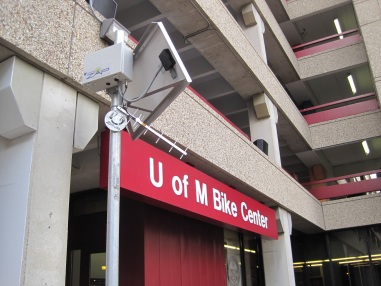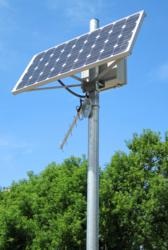RFID Rewards Bike Commuting via Dero ZAP

Communities across the country are seeking ways to encourage alternate, sustainable lifestyle choices. One of the more obvious choices is America’s growing love of bicycling, not just for casual exercise, but also for daily commuting as a tangible example of choosing muscle power over gasoline consumption.
Some communities are actively promoting bike commuting as an environmentally friendly and healthy means of transportation. This is evident not only in the emergence of bike commuting lanes and bike parking infrastructure, but also in the use of RFID (radio frequency identification) technology to measure and report on the progress of bike commuting campaigns.
A clear example is the program implemented by the University of Minnesota, where RFID is being deployed at “commuting stations” to count the number and frequency of cyclists traveling to and throughout the campuses.
(Image, top: Dero ZAP Station at University of Minnesota Bike Center)
The solution selected by the U of M is Dero ZAP, an RFID bike commuting system that features tamper-proof RFID tags attached to the spokes of bikes’ front wheels so the University can tally bike trips and reward students, faculty and staff that use their wheels as a sustainable, healthy mode of transportation.
“The University is putting incentives in place to reward bike commuters,” said Steve Sanders, Bike Coordinator, Parking and Transportation Services,  University of Minnesota. “The RFID units confirm actual, as opposed, to anecdotal arrivals by bike.”
University of Minnesota. “The RFID units confirm actual, as opposed, to anecdotal arrivals by bike.”
(Image, right - Dero ZAP Bike Commuting Station)
“To reward people who commit to bike commuting, accurate data is needed to compute bike usage,” said Rolf Scholtz, President of Dero. “Dero ZAP uses the same technology as RFID systems that identify eligible automobiles for single-occupancy drivers who pay for the privilege of going it alone on HOV lanes. But the RFID technology here is used to encourage people to leave their cars parked and to commute by bike.”
Here’s how it works: Participants are registered with Dero ZAP software and receive a unique RFID tag. Solar-powered ZAP units then can read those RFID tags and identify registered bikes from up to 30 feet away. Twenty RFID reading units have been installed at the U of M’s two Twin Cities campuses.
As an RFID-tagged bicycle comes into the zone of an RFID station, the rider hears a beep and sees a flashing light. The RFID unit then transmits the data wirelessly to a central web server where it’s accumulated, and rewards are determined for cyclists who reach pre-determined levels of participation. The system relies on a simple web-based interface and monitoring software.
Hans Steege, CEO of Dero, noted that the program provides automated, precise and credible counting and reports. “With Dero ZAP,” he said, “colleges, non-profits, and corporations can reinforce bike commuting programs as a practical transit option.”
About Dero
Dero is a provider of bike commuting, parking and storage solutions. A member of the U.S. Green Building Council, the company is headquartered in Minneapolis and maintains offices in San Francisco, New York and Boston to serve corporate, government, academic, and non-profit customers worldwide. Dero donates 15 percent of Dero ZAP revenues to KidCommute, a non-profit organization dedicated to battling childhood obesity by encouraging kids to bike or walk to and from school. Visit http://www.dero.com and http://www.derozap.com for more information, or call 888-337-6729.
(Images courtesy of Dero)
{jcomments on}
Related Articles:
City Recycling Increases 260% due to RFID Tracking
Wash This: Washable RFID Technology for Hotel Linen and Uniform Tracking
